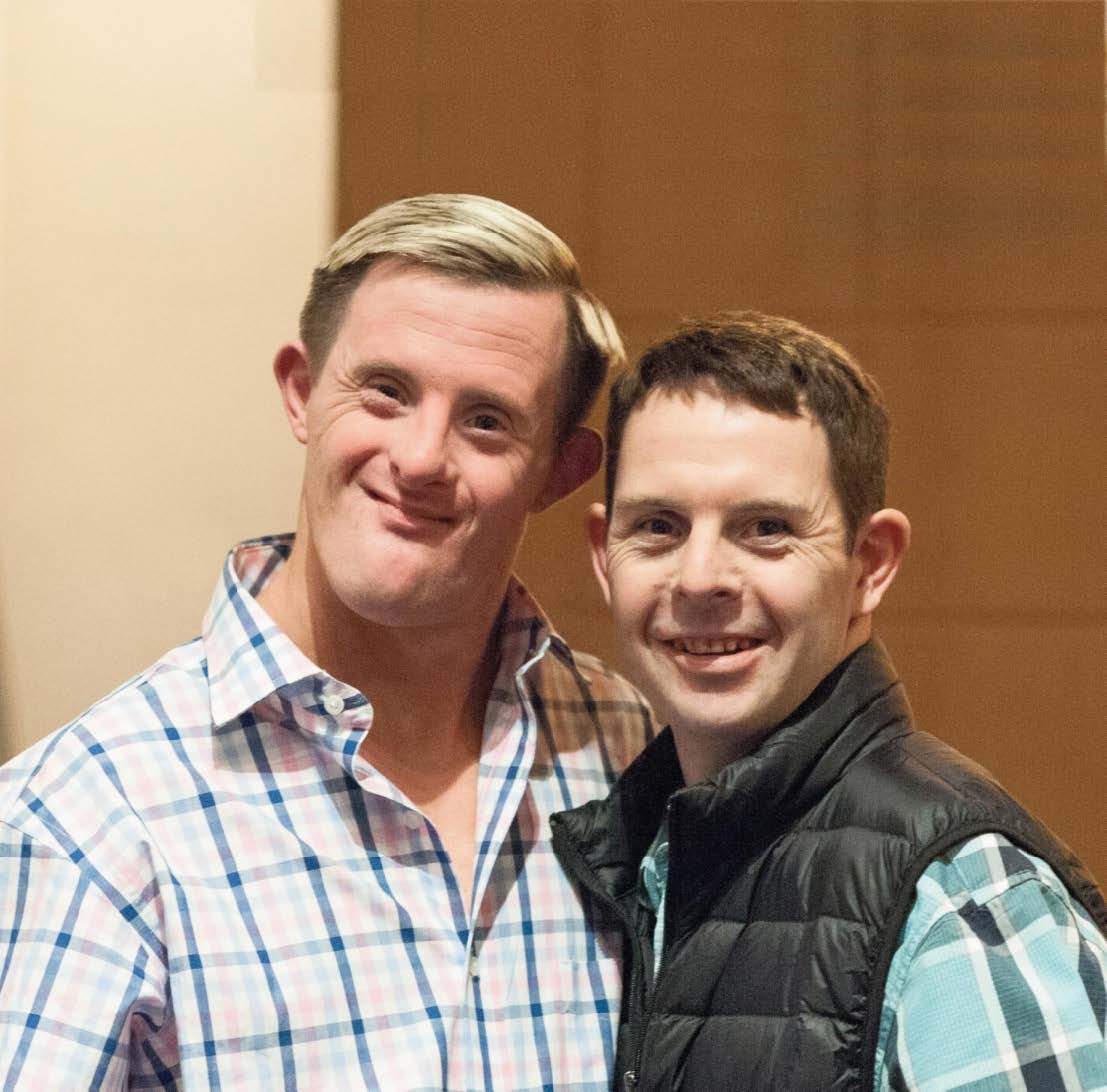
The First Annual Down Syndrome Adult Summit attracted hundreds of self-advocates, along with their families, caregivers and friends, who were welcomed to a conference created to be like no other for adults with Down syndrome.
"Now at last they were beginning Chapter One of the Great Story which no one on earth has read: which goes on forever: in which every chapter is better than the one before." ~ C.S. Lewis
And thus began the First Annual Down Syndrome Adult Summit, as hundreds of selfadvocates, along with their families, caregivers and friends were welcomed to a conference created to be like no other – an opportunity to educate, advocate and celebrate adults with Down syndrome. The summit was created by Jadene Ransdell, the mother of an adult son with Down syndrome and Sara Weir, president and CEO of the National Down Syndrome Society (NDSS), who are sharing the insights they each gleaned from this outstanding experience.
Jadene Ransdell: The Adult Summit began as a dream after I attended a conference in Orlando, sponsored by the Down Syndrome Association of Central Florida. It had been many years since I participated in a gathering of this type. At the end of the conference, as I drove home to Clearwater, I reflected on the joy and hope seen on the faces of parents with little ones with Down syndrome; I recalled the questions they had about school and medical concerns. Every person in attendance seemed pleased with the information they were gathering to make their child's early years and school years successful.
As much as I enjoyed the two days I spent with these sweet families, I wanted more! I wanted sessions that could help me and other parents who have older adults with Down syndrome. Our kiddos are young for a very short time. The pediatricians who knew our little ones were suddenly gone from our lives and we were left trying to piece together care for adults with complex medical needs. Federal laws that ensure an appropriate education and related services do not follow our school-age children into adulthood. Rights that we grew accustomed to, disappear. My son, Matt, has been out of public education programs for more than 20 years. He's been away from his pediatrician for longer than that. As a mom whose career was totally related to disability and family advocacy, I still faced a huge learning curve when Matt became an adult. Reading about Medicaid and how it plays such an enormous part in the lives of people who need services to live in the community was (and continues to be) an unending job. Matt faces multiple health problems, so finding doctors who understand the changes that occur in adults with Down syndrome has not been easy. A few years ago, I began to suspect that Matt was in the early stages of Alzheimer's disease. So many unknowns, so much uncertainty, so much isolation – and yet I knew that I couldn't be the only parent who felt this way.
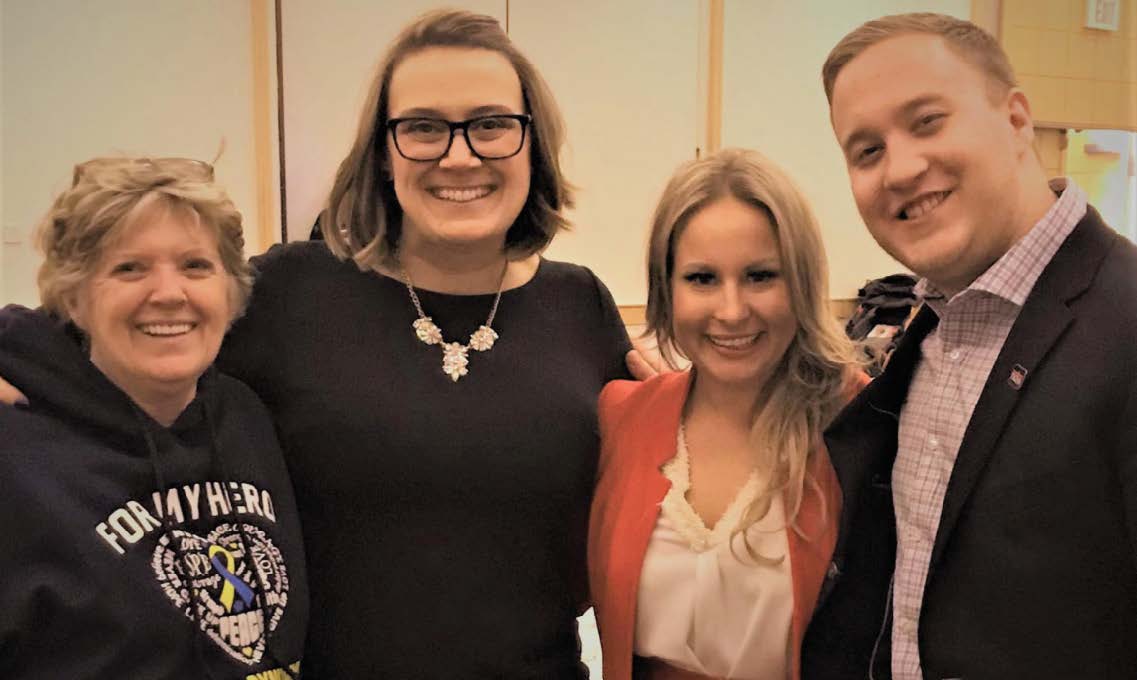
ALL-STAR TEAM: (Left to Right) The Summit Team: Jadene Ransdell, Summit Founder, Kandi Pickard, Sr. VP of Philanthropy, Outreach & Events, Sara Hart Weir, President and CEO, and Caleb Herr, Digital Media Technical Specialist
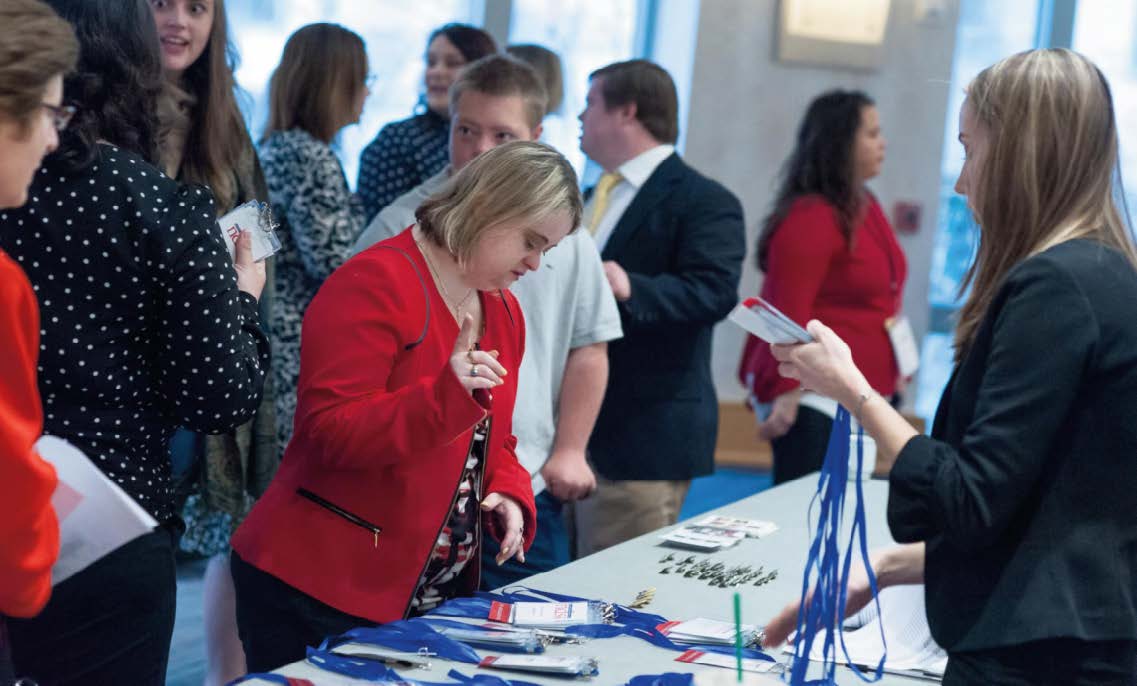
HELLO, MY NAME IS: Kayla McKeon checking the registration table. "My heart filled with joy as I met people who were happy to be there and looking forward to a conference designed for them" said Jadene.
While I drove across I-4 from Orlando to Tampa, those thoughts started building into a realization. Somehow there had to be a chance for families of adults with Down syndrome to get accurate and timely information about the world they now live in. As I considered the idea, I remembered that before I retired, I had organized many such events. I knew I had the skills, but did I have the energy? I had been a state and national family advocate for too many years to count and had been happily retired for about a dozen more. I loved putting my energy into my family and my hobbies – sewing and writing. For several months, the dream lived inside my head and heart. At times I would get overwhelmed and think it was silly to consider such a huge task. I knew from experience that an event of that type would be years in the making – needing to identify partners, secure funding, select a venue and create an interesting program. Every few weeks the dream resurfaced until I finally shared it with some friends and colleagues who also volunteer with the National Task Group (NTG) on Intellectual Disabilities and Dementia Practices. As I tested the water for this dream, I received confirmation that it was a great idea and I should do whatever was needed to make it happen.
In Houston for the annual American Academy of Developmental Medicine and Dentistry Conference, my friend and colleague, Matt Janicki, Co-Chair of the NTG, suggested I speak with Sara about my vision. On a Saturday morning in early June the dream started to become reality. Sara was immediately on board and offered to add the Adult Summit to the already scheduled 2018 Buddy Walk® on Washington. By lunchtime we had dates and a location. Now we had just ten months to pull together a program that would be of interest to families and self-advocates. In early summer, 2017, the partnership between the NTG and NDSS expanded to include the National Alliance for Caregiving.
Sara Hart Weir: As the President and CEO of the leading human rights organization for all people with Down syndrome, it was an easy decision to host an Adult Summit. When I met Jadene she said she had found no other organizations that were conducting events solely focused on the lives of adults with Down syndrome. We saw this as a way to ensure that our self-advocates and their families knew they were forever part of our "tribe." It is and has been the intent of NDSS to encourage self-advocates to find their wings, and to support families through the lifetime of their loved ones with Down syndrome. We quickly decided that we would align the Adult Summit program with the NDSS robust and comprehensive programs and pillars, including healthcare and research, inclusive education, community integration, economic self-sufficiency, in addition to employment and the NDSS #DSWORKS® Employment Program. Because the life expectancy for people with Down syndrome is now well into their 60's we also wanted to include sessions related to older adults and those who are living with Alzheimer's disease.
Planning officially began in July as a small team discussed what topics might be important to self-advocates, their families and friends. NDSS had used the same hotel in 2017 for another event, so there was already an idea of how many sessions we could run over the day and a half of the Summit. It quickly became evident that this would not be an easy task, as the list of potential topics grew long. Eventually, we had a program we felt would be well rounded and appeal to the audience we targeted.
JR: Fast forward to April 8, 2017 when animated energy began to fill the hotel. I had ventured from my room for a mid-morning Chai tea and found the coffee shop connected to the lobby busy and filled with excited chatter as families had arrived early to take in a day of sightseeing. (Mother Nature had been extremely kind as she provided peak bloom of the Cherry blossoms in Washington, DC that weekend.) My heart filled with joy as I met people who were happy to be there and looking forward to a conference designed for them. My smile should have been a clue; they didn't know who I was or that this had been my dream!
SHW: The Summit consisted of 26 breakouts and several plenary sessions led by more than 50 speakers who were professionals, family members and most importantly, self-advocates. We are proud to have offered sessions that were educational, as well as inspiring, sessions that were stimulating and humorous, along with sessions that may have possibly changed lives. Neil Romano, Chairman of the National Council on Disability, opened the Summit with thought-provoking words about the employment of people with disabilities who can be paid less than minimum wage because of a depression-era federal law written more than 80 years ago that was to have been eliminated after five years. He said, "If the last car of the train is not moving forward, the train is not moving." That statement, unfortunately, can be applied to many aspects of the lives of adults with Down syndrome, not just employment. Romano spoke of Dr. Martin Luther King, Jr. being a drum major for justice and called on the self-advocates and other advocates in the room to "Bang your drum loudly!"
It was our great honor to welcome Joe Shapiro and Mary Clayton to lead a conversation about a topic that is often shied away from – sexual assault and misconduct against people with intellectual disabilities. Joe is an investigative correspondent with NPR who recently released a report on this subject. Mary has become an advocate for state and federal reforms after nothing was done to criminalize the assaulter of her daughter who has Down syndrome. One attendee described the session as a "Difficult topic but most informative. I really appreciated the frank conversation." Another attendee found the most surprising part of this session to be the "extent of sexual assaults aimed at persons with intellectual disabilities." Self-advocates imparted their life experiences with Summit participants in several sessions. Sharing the stage with other residential options panelists, self-advocate Douglas Rogers, told the audience what it's like to live independently in the home he grew up in. His sister, Margaret, Ph.D., lives several hours away, supports him from a distance, and visits regularly. Another sibling, Embry Burrus, LSLP, spoke about the challenges over the past three years, as she is once again living with her 60-year-old sister, Margaret following the death of their mother. Embry spoke of the importance for parents to make plans for their sons' or daughters' future and to keep siblings apprised of their wishes. Following of the session, one person said, "It was wonderful to hear so many different stories, viewpoints and relationships and learn about how significant the role of siblings is in the lives of individuals with Down syndrome."
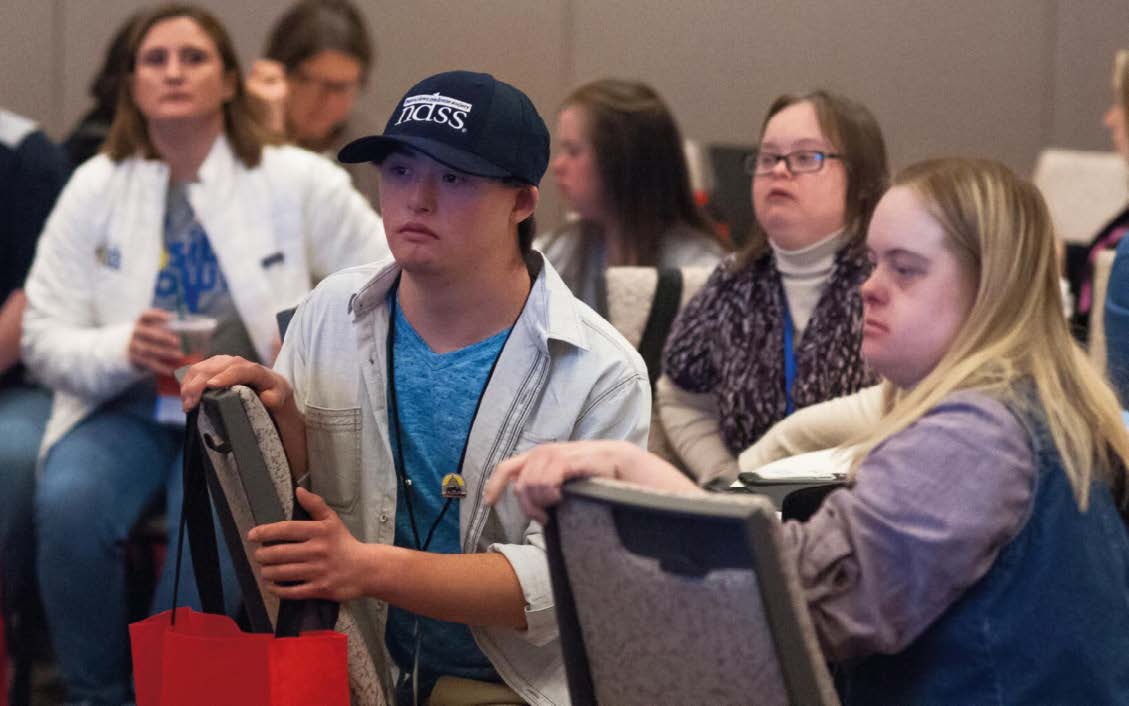
COMING TOGETHER: Self-advocates listen intently in a breakout session. The program included sessions that were educational, inspiring, stimulating, humorous, along with several that may have possibly changed lives.
"If the last car of the train is not moving forward, the train is not moving." That, unfortunately applies to many aspects of the lives of adults with Down syndrome.
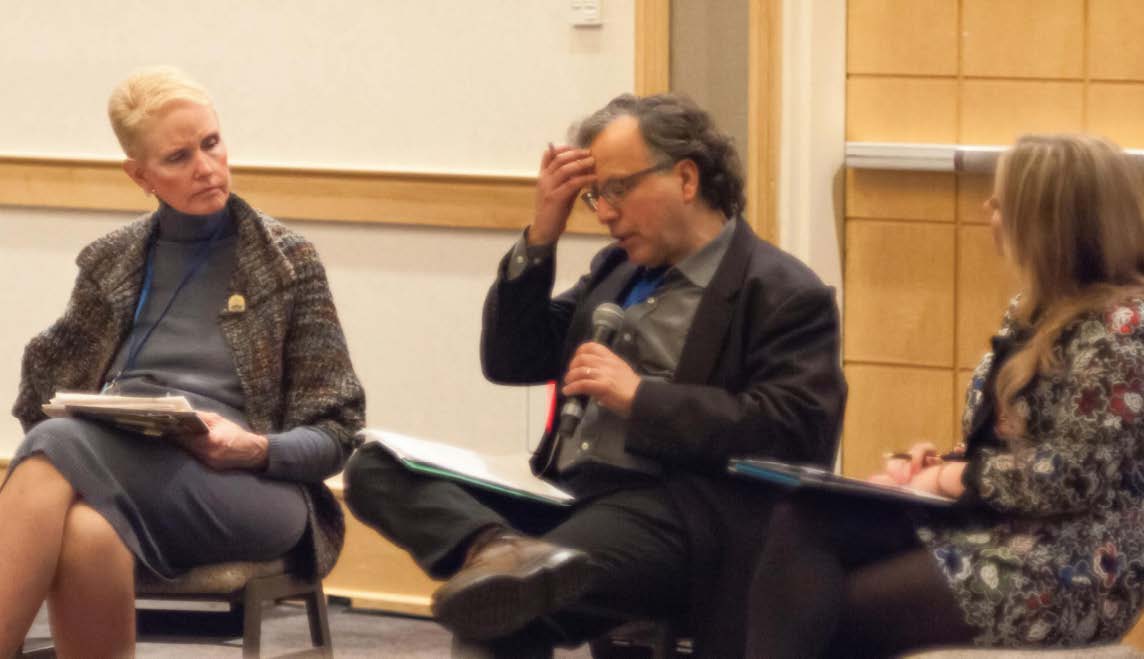
CONFRONTING INJUSTICE: (Left to Right) Mary Clayton, the mother of a sexual assault victim, Joe Shapiro, an Investigations Correspondent for NPR, and Sara Weir lead a conversation about sexual assault against people with disabilities.
Dr. George Capone, Dr. "At our first meeting on Seth Keller, Kathy Service, RN, and Adel Herge, OTD, were some of the presenters in sessions focused on aging adults with Down syndrome, including common medical conditions, and Alzheimer's disease. Sujata Bardhan, Ph.D., represented the National Institute of Health and spoke about the DS Capitol Hill, Jenny spoke right up, describing herself and the need for funding and programs to support greater independence and inclusion." Connect® Registry and Connect® Registry and research opportunities available for adults with Down syndrome. In an anonymous survey, one Summit attendee described the sessions as "Open, candid discussions in providing feedback. It was good to know that my thoughts did not fall on deaf ears." Another person commented, "All of the sessions that I attended were full of useful & practical information!"
One of the highlights of the Summit was a networking opportunity for self-advocates only. During this session, members of the NDSS Self-Advocate Advisory Board served as hosts and led a dis cussion on advocacy in all aspects of life. We received an email from the mother of one of the participants in this breakout session.
"At our first meeting on Seth Keller, Kathy Service, RN, and Adel Herge, OTD, were some of the presenters in sessions focused on aging adults with Down syndrome, including common medical conditions, and Alzheimer's disease. Sujata Bardhan, Ph.D., represented the National Institute of Health and spoke about the DS Capitol Hill, Jenny spoke right up, describing herself and the need for funding and programs to support greater independence and inclusion."
n. "I want to thank you and NDSS. My daughter Jennifer (Jenny) Holden reached out to you before the Adult Conference and Buddy Walk® on Washington. She was interested in the Self-Advocates Speak-Out Lunch. You responded, encouraging her to take part. And she did, attending both the NDSS Adult Conference and the Buddy Walk on Washington. Through these events, Jenny had an opportunity to try out new self-advocacy skills, and I had an opportunity to see what she could do. We both found the experience exhilarating and inspiring.
Jenny hadn't expressed much interest in attending conferences like this since she'd graduated from the GMU Mason LIFE Program. (While a student, she had attended conferences on higher education for students with disabilities.) Her days tend to follow a routine, going to work, playing Special Olympics, acting with ArtStream and visiting with friends. Although she has done some public speaking for the Arc and for Town Hall meetings with state delegates, she had always had a script and read her speeches. While a student, she had interned on Capitol Hill for Rep. Pete Sessions, but she had never gone to Capitol Hill as an advocate. But with the announcement of the NDSS events, Jenny wanted to see her friends Charlotte Woodward and Adrian Forsythe and even David Egan speaking out.
Jenny and I both enjoyed the conference sessions at the hotel, and we learned a lot. (I had not been at this type of conference since she was small.) We prepared for the meetings on Capitol Hill but did not really know what to expect. Our first meeting was at Senator Warner's office. There were about 25 of us representing NDSS including about 10 self-advocates of varied ages. When the senator's staffer decided to start by talking with selfadvocates, Jenny spoke right up, describing herself and the need for funding/programs to support greater independence and inclusion. I was very impressed. Similarly, on the House side, when speaking with Representative Barbara Comstock and a special assistant to Representative Gerald Connolly (and the congressman himself, if only briefly), Jenny was relatively outgoing and confident. Jenny also gave each member her bio and her business card. I was surprised and delighted. Having seen Jenny and the other self-advocates in action, I truly think they made an impact. Thanks for giving my daughter and myself this opportunity.
Jenny hadn't expressed much interest in attending conferences like this since she'd graduated from the GMU Mason LIFE Program. (While a student, she had attended conferences on higher education for students with disabilities.) Her days tend to follow a routine, going to work, playing Special Olympics, acting with ArtStream and visiting with friends. Although she has done some public speaking for the Arc and for Town Hall meetings with state delegates, she had always had a script and read her speeches. While a student, she had interned on Capitol Hill for Rep. Pete Sessions, but she had never gone to Capitol Hill as an advocate. But with the announcement of the NDSS events, Jenny wanted to see her friends Charlotte Woodward and Adrian Forsythe and even David Egan speaking out.
Jenny and I both enjoyed the conference sessions at the hotel, and we learned a lot. (I had not been at this type of conference since she was small.) We prepared for the meetings on Capitol Hill but did not really know what to expect. Our first meeting was at Senator Warner's office. There were about 25 of us representing NDSS including about 10 self-advocates of varied ages. When the senator's staffer decided to start by talking with self-advocates, Jenny spoke right up, describing herself and the need for funding/programs to support greater independence and inclusion. I was very impressed. Similarly, on the House side, when speaking with Representative Barbara Comstock and a special assistant to Representative Gerald Connolly (and the congressman himself, if only briefly), Jenny was relatively outgoing and confident. Jenny also gave each member her bio and her business card. I was surprised and delighted.
JR: Jeanne was not the only parent to share that she had not recently attended a conference of this type. As Sara, the NDSS staff and I mingled with the crowd at the Summit, we couldn't stop smiling. I shed many tears of joy as I watched and listened in wonder as self-advocates, family members and other advocates spoke so positively about their experience. Several parents expressed their happiness that this was an event that focused on topics important to adults with Down syndrome. Some even shared that when they go to conferences, was able to share what she learned at the Summit with the new doctor who reviewed more than five years of test results and was able to tell Tracy that Jonathon is not dying. He doesn't have Alzheimer's disease, although he does have memory loss. Tracy told me that attending the Summit changed her life – and Jonathon's life. N DSS has done a tremendous job speaking for young children and youth with Down syndrome. They they spend their time outside the workshops, chatting with other parents of adults, as the session content no longer applies to their son or daughter.
A couple of weeks after the Summit I The response to the Summit was tremendously positive, and NDSS is thrilled to announce that it approved funding to support another Adult Summit in 2019. received a text from a parent who had attended the Summit. Theresa (Tracy) Godin Morrison had been told that her son, Jonathon, 27, had Alzheimer's disease. As she listened to the medical professionals who spoke at the Summit, she could recognize the losses he has experienced over the past several years. At the same time, she kept hearing them say people as young as Jonathon don't typically have Alzheimer's – even if they are showing regression. Tracy had already done a lot of detective work before the Summit and followed up with one more appointment to unravel the mystery. She was able to share what she learned at the Summit with the new doctor who reviewed more than five years of test results and was able to tell Tracy that Jonathon is not dying. He doesn't have Alzheimer's disease, although he does have memory loss. Tracy told me that attending the Summit changed her life – and Jonathon's life.
The response to the Summit was tremendously positive, and NDSS is thrilled to announce that it approved funding to support another Adult Summit in 2019.
NDSS has done a tremendous job speaking for young children and youth with Down syndrome. They believed the Adult Summit was an opportunity to clearly show their continued support for adults and those aging with Down syndrome. The Summit showed the strong commitment NDSS, the NTG and the NAC have made to educate, advocate, and celebrate all adults with Down syndrome. The response to the Summit has been tremendously positive, and NDSS is thrilled to announce that the Board of Directors, led by Gordon Spoor of St. Petersburg, Florida, approved funding to support another Adult Summit in 2019. The partnership with the NTG and the NAC continues and has expanded to include the Down Syndrome Guild of SE Michigan and all affiliates in Michigan to bring the Second Annual Adult Summit to Detroit, April 25, 26, 27, 2019. Visit ndss.org/ndss-adult-sum- mit/ at NDSS.org for more information regarding the upcoming 2019 Adult Summit and stay tuned for more updates throughout the year. In his luncheon address, David Eagan, a self-advocate and Joseph P. Kennedy Jr. Foundation Public Policy Fellow, said it so well, "The things that make us different are the same things that make us awesome!" •